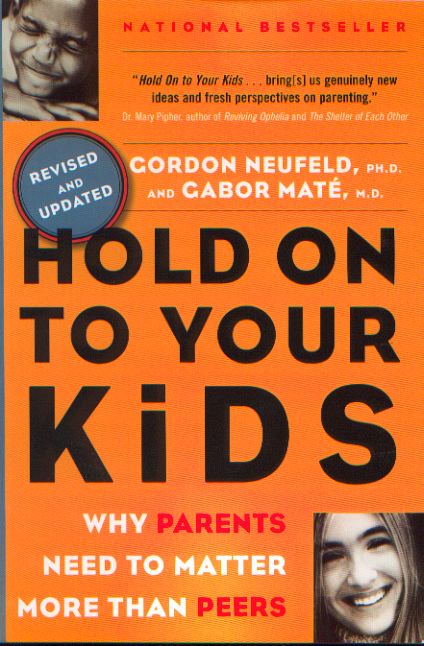Who Should Really Take A Time Out?
This summer, a seven-year-old boy in Timmins, Ontario, became front-page news across the nation because his parents are suing the local board of education. They allege that he has been repeatedly locked in a closet at school to control his behaviour.
Such punishment may seem cruel, but it is not all that unusual. It’s an extreme example of the classic “time-out” — one of the more prevalent, and pernicious, notions advocated by parenting experts.

Not long ago, the mother of a young girl with attention-deficit disorder wrote to me saying that, when her daughter was 3, psychologists advised a similar time-out to discourage her temper tantrums. Lock her in a closet, they suggested, “where she couldn’t hurt herself.”
How is that supposed to work? In theory, the time-out makes obstreperous behaviour unattractive by, in effect, the use of shunning. Having ignored repeated requests to act properly, children are physically removed from their parents — most often by being banished to their rooms. This supposedly teaches them some valuable lesson about what is and what is not acceptable.
Any success of the time-out (if you can call intimidating a child success) is temporary at best. In fact, the technique employed by so many well-meaning parents and educators actually sabotages healthy development. It exploits and deepens a child’s greatest terror: being abandoned by those whose unconditional love and acceptance he or she requires.
Playing on this fear may achieve compliance for a short time, but at an enormous cost. The young child’s limbic system, the brain’s emotional apparatus, cannot handle that much vulnerability. The result is the shutdown of feeling that older children express when they say “I don’t care” or “whatever.”
As well, the banishment weakens children’s attachment to their parents. This diminishes the most powerful force adults have working on their behalf: the child’s desire to be close to them, to connect with them.
The time-out is a product of behaviourism, a branch of psychology that assumes children can be trained like lab rats by using reward and punishment. Behaviourist techniques dominate much of the parenting literature. They have popular appeal in a society that looks to simple mechanical solutions for a wide range of problems, and in a culture that has lost sight of how important the parent-child bond really is.
In his book Time-in Parenting, Otto Weininger challenges the reigning behaviourist orthodoxy. The professor emeritus of psychology at the University of Toronto says it is precisely when children behave badly that parents must be in direct contact and demonstrating their commitment. “When children are upset, out of control, rude or angry,” he writes, “what they need most is to be with a safe and accepting adult. . . . They also need someone who can help them express those feelings appropriately.”
Time out “exploits and deepens a child’s greatest terror: being abandoned by those whose unconditional love and acceptance he or she requires. Playing on this fear may achieve compliance for a short time, but at an enormous cost. The young child’s limbic system, the brain’s emotional apparatus, cannot handle that much vulnerability. The result is the shutdown of feeling that older children express when they say “I don’t care” or “whatever.” |
Outrageous behaviour, rage displays, tantrums are always symptomatic of some frustration the child is experiencing, a frustration the child is either unable to identify or to explain in words. “Sending the upset child away means that we are also sending the problem away for the child to deal with,” the author adds. “What it really implies is that we can’t deal with it ourselves. The child just feels rejected.”
 Using the child’s dependence on us as leverage to enforce compliance, we only increase the frustration. We set in motion a vicious cycle. As the child’s frustrations rise, so will the hostility. Following the opinions of the behaviourists, we will then raise the ante of separation and punishment. We will end up liking our child less and less because, as he or she shuts down emotionally, there will be less and less desire to be close to us.
Using the child’s dependence on us as leverage to enforce compliance, we only increase the frustration. We set in motion a vicious cycle. As the child’s frustrations rise, so will the hostility. Following the opinions of the behaviourists, we will then raise the ante of separation and punishment. We will end up liking our child less and less because, as he or she shuts down emotionally, there will be less and less desire to be close to us.
In fact, the feeling will be quite the opposite — unless the spirit is so crushed the child is desperate to please. In that case, we increase the risk of being ostracized by his or her peers and the risk of depression and illness later in life. That is something I have often seen in my medical work.
So, is the time-out a complete waste of time? No. It has one perfectly acceptable application: adults. Such a respite is just what grownups need when their own emotions are out of control. In such cases, they and not the child are the ones taking a time-out.
We all lose it on occasion. Our frustrations get the better of us. At such a moment, without blaming the child or demanding obedience, we can acknowledge that we’re having difficulty coping and take a moment to collect ourselves.
So, while taking a few deep breaths, whether at home or in the classroom, we can remind ourselves that a child’s long-term development, not quivering compliance, is our most sacred objective.

